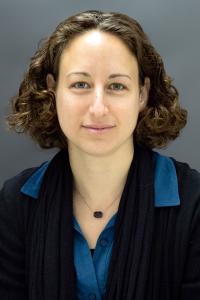Michal Levo, PhD
- Assistant Professor in the Department of Biochemistry and Molecular Biophysics
On the web

Overview
Michal Levo is an assistant professor in the Department of Biochemistry and Molecular Biophysics, and the Program for Mathematical Genomics, at Columbia University. Michal gained an interdisciplinary education with a dual undergraduate degree in Computer Science and Life sciences.
Realizing the key role of gene regulation in shaping cellular identity initiated Michal’s ongoing pursuit to understand what determines when, where and to what extent each gene is expressed.
Michal received a PhD from the Weizmann Institute of Science, where as a recipient of the Azrieli PhD fellowship, she studied how regulatory instructions are encoded within individual regulatory DNA sequences. Michal developed high-throughput sequencing-based approaches to measure gene activity and single-cell binding events across thousands of systematically designed regulatory sequences. These measurements, coupled to computational analysis and modeling (including thermodynamic and machine learning approaches), elucidated determinants of gene activity outside the classically characterized transcription factor (TF) binding motifs. These studies demonstrated how differential TF binding can be predicted from sequences flanking core motifs, based on sequence composition or DNA shape features. They further revealed how properties of TF-nucleosome interplay, characterized at the single molecule level, quantitively tune gene activity.
In her postdoc Michal sought a complementary skillset that would allow her to ‘see’ gene regulation in action, in individual cells of a developing organism. She pursued a postdoc under the joint supervision of Prof. Michael Levine, a developmental and molecular biologist, and Prof. Thomas Gregor, a biophysicist, at Princeton University. As a postdoctoral fellow (recipient of the EMBO, Rothschild and HFSP fellowships), Michal harnessed advances in genome editing and single cell live imaging to quantify endogenous transcription dynamics and dissect their determinants in complex genomes. This facilitated the discovery of a pervasive genomic strategy for transcriptional coupling of distant regulatory genes in living embryos. In her new lab Michal continues to study how functionality, and specifically precise spatiotemporal gene activity patterns, emerge in the complex landscape of eukaryotic genomes.
Academic Appointments
- Assistant Professor in the Department of Biochemistry and Molecular Biophysics
Research
Coordinated activation of subsets of genes, at specific tissues and developmental times, governs cell fate decisions and cellular behavior. We now know that genomes are replete with regulatory sequences guiding this spatiotemporal activation of genes. Developmental disorders and diseases are often associated with disruptions to this regulatory code. As our mapping of eukaryotic genomes improved in the last few decades, we learned that the number of regulatory DNA elements greatly exceeds the number of genes, and these elements can reside far away along the genome from their target gene. What are the mechanisms that mediate gene regulation within this genomic labyrinth remains an open question. How do regulatory elements communicate with their target genes? What ensures the right regulatory interactions take place at specific cells and times? What are the molecular agents bringing the regulatory instruction to life? And how are properties of the local chromatin environment and the broader 3D genome organization related to the regulation of gene activity?
The Levo lab combines several experimental modalities (from genomic assays to live subcellular imaging), with computational analysis and modeling, to study the dynamic, multilayered control of gene expression in the service of differentiation and development. Studies focus on perturbation-based approaches and quantitative measurements to facilitate causal insights and inform predictive models.
To learn more about the research, visit the Levo Lab.
Selected Publications
- Michal Levo*, João Raimundo*, Xin Yang Bing, Zachary Sisco, Philippe J. Batut, Sergey Ryabichko, Thomas Gregor, Michael S. Levine.
Transcriptional coupling of distant regulatory genes in living embryos. Nature. 2022 - Hongtao Chen, Michal Levo, Lev Barinov, Miki Fujioka, James B. Jaynes, Thomas Gregor.
Dynamic interplay between enhancer-promoter topology and gene activity. Nature Genetics. 2018 - Michal Levo, Tali Avnit-Sagi, Maya Lotan-Pompan, Yael Kalma, Adina Weinberger, Zohar Yakhini, Eran Segal. Systematic investigation of transcription factor activity in the context of chromatin using massively parallel DNA binding and expression assays. Molecular Cell. 2017
- Michal Levo*, Einat Zalckvar*, Eilon Sharon, Ana Carolina Dantas Machado, Yael Kalma, Maya Lotam-Pompan, Adina Weinberger, Zohar Yakhini, Remo Rohs, Eran Segal. Unraveling determinants of transcription factor binding outside the core binding site. Genome Research. 2015
- Michal Levo and Eran Segal. In pursuit of design principles of regulatory sequences. Nature Reviews Genetics. 2014
- Tali Raveh-Sadka*, Michal Levo*, Uri Shabi, Boaz Shany, Leeat Keren, Maya Lotan-Pompan, Danny Zeevi, Eilon Sharon, Adina Weinberger, Eran Segal. Manipulating nucleosome disfavoring sequences allows fine-tune regulation of gene expression in yeast. Nature Genetics. 2012
For a complete list of publications, please visit PubMed.gov